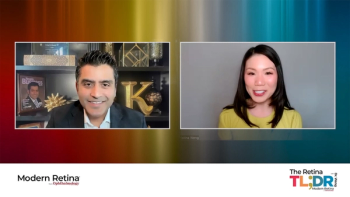
Trial to study treatment of DME in underrepresented patients begins
The trial will study the effect of the drug in treatment-naïve patients with diabetic macular edema (DME) who are members of underrepresented patient populations, ie, Black, Hispanic, Latin American, and Indigenous people.
The Elevatum trial of Vabysmo (faricimab-svoa, Genentech, Inc.), an anti-VEGF drug, has begun, according to company representatives. The trial will study the effect of the drug in treatment-naïve patients with diabetic macular edema (DME) who are members of underrepresented patient populations, ie, Black, Hispanic, Latin American, and Indigenous people.
According to the company, the study was designed specifically “to ease the barriers to clinical trial participation faced by underrepresented racial and ethnic groups. That includes broadening eligibility criteria which could inadvertently exclude patients from various racial groups, ensuring diverse clinical site leaders, and providing transportation and other resources and services to make trial participation easier for people. The overall goal of the study is to better understand how these traditionally underrepresented patient populations with DME respond to treatment in order to help deliver better, more equitable care.”
Genentech believes that this is the first company-sponsored trial to focus on these patients populations.
Manuel Amador, MD, a lead investigator in the trial and medical director for Genentech, commented, that these groups “… are disproportionately affected by diabetes and are at higher risk of developing vision-threatening DME.”
Elevatum trial
The trial is a phase IV, multicenter, open-label, single-arm trial designed specifically to study Vabysmo in underrepresented populations. The first patient was recently treated in the study. The study is presently recruiting in 8 centers across the US.
This interventional clinical trial is expected to enroll 120 participants, according to the trial registered at ClinicalTrials.gov (NCT05224102). They will be treated with 6-mg intravitreal injections of faricimab once every 4 weeks up to week 20 and then with 6-mg intravitreal injections of faricimab once every 8 weeks out to week 52. The patients will undergo a safety follow-up visit on week 56, that is 28 days or longer after their last study treatment.
The primary outcome measure is the change in the best corrected visual acuity (BCVA) at the 56 week visit compared with the baseline value.
The secondary outcome measures include the percentage of patients with 2-step or greater and 3-step or greater improvements in the Early Treatment Diabetic Retinopathy Study Scale over time, the percentage with no intraretinal/subretinal fluid over time, the change in the central subfield thickness over time, the percentage of patients gaining 15 or more letters or 10 or more letters in the BCVA at the final visit, percentage not losing 15 or more letters or 10 or more letters in BCVA at the final visit, and the incidence and severity of ocular and non-ocular adverse events at the final visit.
Newsletter
Keep your retina practice on the forefront—subscribe for expert analysis and emerging trends in retinal disease management.

































